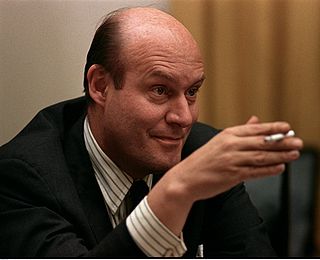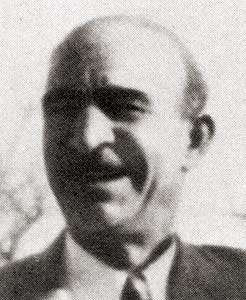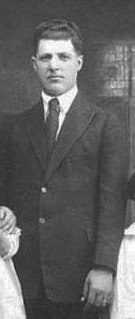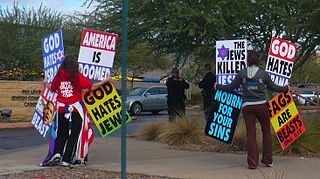Related Research Articles
Defamation is the oral or written communication of a false statement about another that unjustly harms their reputation and usually constitutes a tort or crime. In several countries, including South Korea, a true statement can also be considered defamation.
Salvatore Maranzano was an organized crime figure from the town of Castellammare del Golfo, Sicily, and an early Cosa Nostra boss who led what later would become the Bonanno crime family in New York City. He instigated the Castellammarese War in 1930, to seize control of the American Mafia, winning the war after the murder of rival faction head Joe Masseria in April 1931. He then briefly became the Mafia's capo di tutti capi and formed the Five Families in New York City, but was murdered on September 10, 1931, on the orders of Charles "Lucky" Luciano, who established an arrangement in which families shared power to prevent future turf wars: The Commission.

Joseph Michael Valachi was an American gangster in the Genovese crime family who is notable as the first member of the Italian-American Mafia to, in 1963, acknowledge its existence publicly. He is credited with the popularization of the term cosa nostra.

Nicholas deBelleville Katzenbach was an American lawyer who served as United States Attorney General during the Lyndon B. Johnson administration.

Peter Maas was an American journalist and author. He was born in New York City and attended Duke University. Maas had Dutch and Irish heritage.

A Nation of Immigrants (ISBN 978-0-06-144754-9) is a 1958 book on American immigration by then U.S. Senator John F. Kennedy of Massachusetts.
Sigmund G. Livingston was a German-born American Jewish attorney working in Chicago, Illinois. Livingston was the founder and first president of the Anti-Defamation League, and the author of the book Must Men Hate. The League's annual Sigmund Livingston Award, which recognizes individuals for outstanding contributions to furthering civil rights and fighting injustice, is named after him, as is its Sigmund Livingston Fellowship.
Stefano "Steve" Ferrigno was a New York City mobster of Sicilian origin who led an important Italian criminal gang in the 1920s. Ferrigno was murdered along with Alfred Mineo during the so-called Castellammarese War.
Buster from Chicago was a pseudonym used for a mobster and freelance hitman of the 1930s. He is alleged to have played a key role in the Castellammarese War (1929–1931) as the assassin of Giuseppe Morello and others. Some claim that Buster was gangster Sebastiano Domingo (1910–1933), notably Bill Bonanno, the son of Bonanno crime family leader Joseph Bonanno, who participated in the War. Others charge that Buster is a character created by Joe Valachi to evade his responsibility for various killings. Buster died on May 30, 1933.

Frank Scalice, also known as "Don Ciccio" and "Wacky", was an Italian-American mobster active in New York City, who led the future Gambino crime family from 1930 to 1931. He was underboss from 1951 until his murder on June 17, 1957.

Gaetano Reina was an Italian-American gangster. He was an early American Mafia boss who was the founder of what has for many years been called the Lucchese crime family in New York City. He led the family until his murder on February 26, 1930, on the orders of Joe Masseria.

The Valachi Papers is a 1972 Italian-French crime neo noir directed by Terence Young, produced by Dino De Laurentiis, and distributed by Columbia Pictures. It is an adaptation of the 1968 non-fiction book of the same name by Peter Maas, with a screenplay by Stephen Geller. It tells the story of Joseph Valachi, a Mafia informant in the early 1960s who was the first ever mafioso to acknowledge the organization's existence. The film stars Charles Bronson as Valachi and Lino Ventura as crime boss Vito Genovese, with Jill Ireland, Walter Chiari, Joseph Wiseman, Gerald S. O'Loughlin, Guido Leontini, Amedeo Nazzari, Fausto Tozzi, Pupella Maggio, and Angelo Infanti.
Underboss is a 1997 biographical book based on the life of Sammy "The Bull" Gravano. The book goes through Gravano's early life up to 1997, which does not cover his re-arrest. The book's author is Peter Maas, who also wrote the book The Valachi Papers. Although Peter Maas is the credited author, Gravano was interviewed multiple times to describe what happened in his life. The book is published by HarperCollins Publishing Company.
Hispanophobia or anti-Spanish sentiment is a fear, distrust, hatred of; aversion to, or discrimination against the Spanish language, Hispanic, Latino and/or Spanish people, and/or Hispanic culture. The historical phenomenon has had three main stages by originating in 16th-century Europe, reawakening during 19th-century disputes over Spanish and Mexican territory such as the Spanish–American War and the Mexican–American War, and finally in tandem with politically-charged controversies such as bilingual education and illegal immigration to the United States.
The Valachi hearings, also known as the McClellan hearings, investigated organized crime activities across the United States. The hearings were initiated by Arkansas Senator John L. McClellan in 1963. Named after the major government witness against the American Mafia, foot soldier and made man Joseph Valachi, the trial exposed American organized crime to the world through Valachi's televised testimony. At the trial, Valachi was the first member of the Italian-American Mafia to acknowledge its existence publicly, and is credited with popularization of the term cosa nostra. The trial also exposed the hierarchy of the American Mafia, including the Five Families and The Commission.

Antisemitism in the United States has existed for centuries. In the United States, most Jewish community relations agencies distinguish between antisemitism, which is measured in terms of attitudes and behaviors; and the security and status of American Jews, which are measured by specific incidents. FBI data shows that Jews were the most likely group to be targeted for religiously-motivated hate crimes in every year since 1991, the Anti-Defamation League said in 2019. Evidence suggests the true number of hate crimes against Jews is underreported, as is the case for many targeted groups.

The Valachi Papers is a 1968 biography written by Peter Maas, telling the story of former mafia member Joe Valachi, a low-ranking member of the New York-based Genovese crime family, who was the first ever government witness coming from the American Mafia itself. His account of his criminal past revealed many previously unknown details of the Mafia. The book was made into a film in 1972, also called The Valachi Papers, starring Charles Bronson as Valachi.

Ethnic Cleansing is a first-person shooter video game for Microsoft Windows computers, created by the American white supremacist and hate organization National Alliance on January 21, 2002. As part of a "Race War", the player controls a neo-Nazi skinhead or a Klansman and is tasked with killing stereotypical African, Mexican, and Jewish enemies, ending with then-Israeli Prime Minister Ariel Sharon.

The Anti-Defamation League (ADL), formerly known as the Anti-Defamation League of B'nai B'rith, is an international Jewish non-governmental organization based in the United States. It was founded in late September 1913 by the Independent Order of B'nai B'rith, a Jewish service organization, in the wake of the contentious conviction for murder of Leo Frank. ADL subsequently split from B'nai B'rith and continued as an independent US section 501(c)(3) nonprofit. ADL states that its mission is twofold: "To stop the defamation of the Jewish people, and to secure justice and fair treatment to all," via the development of "new programs, policies and skills to expose and combat whatever holds us back." With a focus on combating antisemitism and other forms of hate, and fighting domestic extremism both online and off, ADL describes its "ultimate goal" as "a world in which no group or individual suffers from bias, discrimination or hate." In 2018, ADL rebranded as an "anti-hate" organization, adopting the motto "Fighting Hate for Good".
The kiss of death is the sign given by a mafioso boss or caporegime that signifies that a member of the crime family has been marked for death, usually as a result of some perceived betrayal. It is unclear how much is based on fact and how much on the imagination of authors, but it remains a cultural meme and appears in literature and films. Illustrative is the scene in the film The Valachi Papers when Vito Genovese gives the kiss of death to Joe Valachi to inform him that his betrayal of "the family" is known, and that he will be executed.
References
- ↑ Vincent J. Cannato. The Ungovernable City: John Lindsay and His Struggle to Save New York. Basic Books, 2001. p.391.
- ↑ TIME [ permanent dead link ]
- ↑ Project MUSE
- 1 2 The Valachi Papers, Censorship (accessed March 6, 2011)